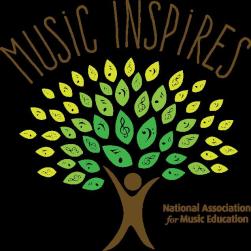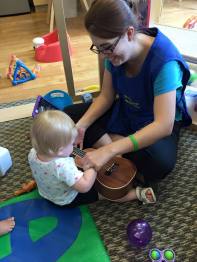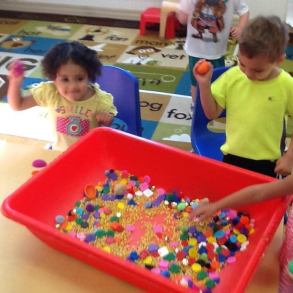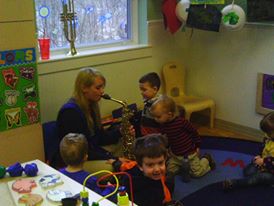Music on the Mind
Contributed by Toni Berrafato, Education Specialist
Music plays a large role in your life, no matter what age you may be. A walk through the grocery store, a ride in the car, cooking dinner at home with your family, or dancing with the little ones in your classroom are just a few examples of how music has the ability to enhance everyday experiences. March is one of my favorite months. Not just because the snow (might) begin to melt, but also it just so happens to be music in our sc hools month!
hools month!
The National Association for Music Education (NAfME) promotes the month of March as a
celebration which engages music educators, students, and communities from around the country in promoting the benefits of high quality music education programs in schools. Although little ones in our care may not yet be able to play their scales or sing a tune perfectly in key, each musical experience that they are exposed to plays a large role in the development of their music aptitude and other underlying cognitive benefits that are developed through music learning.
Did you know….?
There has been a lot of research on the development and stabilization of music aptitude. The results show that music aptitude is developed during the early years of life! Children are born with a natural musical aptitude that can fluctuate until the age of nine. After nine  years old, children cannot achieve in music beyond their stabilized music aptitude.
years old, children cannot achieve in music beyond their stabilized music aptitude.
How does this apply to early childhood education? Music aptitude fluctuation depends on the quality and frequency of informal musical instruction and experiences that little ones are exposed to! Since the children in our care are at the optimal age for music aptitude development, it is our responsibility to provide them with a high-quality environment in order to help them reach their maximum musical potential throughout their entire life!
Other Benefits
Aside from the development of musical abilities, there are a number of other areas of development that benefit from a music-rich environment.
–Mathematics- Music is math! Research shows that there is a connection between music learning and success in mathematics. Rhythm and patterning (among other concepts) are musical attributes that help children understand math.
– Spatial intelligence- Children who are exposed to instrument play at a young age develop a higher ability in spatial intelligence. Where to hit a drum, how to play the xylophone, and even how to hit two sticks together are just a couple skills that help children perceive relationships in the visual world.
–Language Development- It’s no secret that nursery rhymes are necessary for children to experience before they are able to read. Beyond the benefits of hearing language, music also provides children the opportunity to sort through auditory nuances.
-Memory- Music games and favorite songs all encourage little ones to tap into their memory to recreate the tunes that they love! Research shows that children exposed to music are more likely to have a reliable memory.
What can I do?
You do not have to be the next Mozart in order to provide children with optimal experiences for learning. By simply incorporating music into your everyday routine, you can provide children with the high-quality environment that they need to be successful long-term.
- Sing a song every single day. (Remember, frequency is important too!)
- Dance with your little ones. Non-mobile babies, small toddlers, and even preschool students will benefit from being picked up and danced with! This helps to develop beat and rhythm awareness. Any music & movement activity is beneficial to your little ones development!
- Play instruments individually and in a group!
 If the only music that children are exposed to every single day are the three bullet points listed above, then you are providing little ones with rich musical experiences.
If the only music that children are exposed to every single day are the three bullet points listed above, then you are providing little ones with rich musical experiences.
Music is also more meaningful when it is paired with relationships! Remember to invite special guests to share their musical talents for our annual musical sharing event on March 30th and 31st.
Click here for specific activity suggestions for PreS/PreK aged children and here for Infant/Toddler.
To explore more about music aptitude and benefits you can visit these websites:
The Gordon Institute for Musical Learning